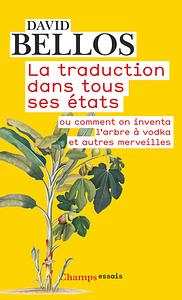Take a photo of a barcode or cover
Another Linguistics book that I have wanted to read for awhile....translation and what it means...in all its forms and ways. The issue wasn't the topic- I enjoy translation- it was one of my favorite classes in college....the issue was that this book was so dry...I had to force myself to read parts of it every day to finish it.
Read if you are interested in translation...
M&L Reading Challenge 2024: a book with a question in the title
Read if you are interested in translation...
M&L Reading Challenge 2024: a book with a question in the title
challenging
informative
slow-paced
I'm giving this one five stars for making me think. The author is an experienced translator and a teacher thereof, and so his expertise is unquestionable. Whether his his conclusions are is another matter, but for me, he writes with real insight and presents the whole issue of translation from perspectives I'd never considered before. He also does so with wit and humour - or at least with a wit and humour that appealed to me, judging by the number of other reviewers who complained about the lack of humour. An example of the author's very dry, understated humour that made me smile, toward the end of the book
I don’t know whether language is possible without thought—on the face of it, it must be, since so many people speak without thinking
In all, a dense and informative read that challenged a lot of my preconceptions and definitely enhanced my appreciation for the critical role translation and translators play in the modern world. Not an easy read and at times it did seem a bit repetitive, but the concepts discussed fascinated me and the cogency of the author's presentation was impressive. For anyone interested in languages, I'd say this book is well worth the effort.
This was a super interesting, although at times admittedly dense, read. Not as dense as the reading on translation studies that I have to do for uni though! It's also a lot broader, and more philosophical, and really gives a nice background on the history of translation. Really enjoyed reading it and found parts really fascinating, but I'm also definitely excited to move onto reading some fiction now.
Me ha gustado mucho más de lo que esperaba. Un poquito de todo sobre la traducción ✨
David Bellos is an English translator who has gained fame for his translations of French-language literature, such as Georges Perec and Ismail Kadare. His involvement of many decades in literary translation has led him to think long and hard on matters of translation, and in this book he aims to share all these musings with a general audience.
Thus, Bellos talks about what “translation” is exactly – some languages, such as Japanese, have no one single term that corresponds to the English word, but rather they consider more specific cases while English-speakers assume that there exists an abstract covering them all. He looks at the debate about whether translation can ever be a true reflection of the original. Different translation approaches are illustrated by examples from literary translation, as well as from missionaries’ translations of the Bible into languages very different from European ones in terms of semantics and cultural context. He comments on the phenomenon by which so much is translated out of English but so little into it, and how English has covertly influenced the literary styles of today’s European languages.
I am trained in linguistics and I have worked in the translation industry, so I assumed that this book would be right up my alley. However, I was not particularly impressed about it. Firstly, Bellos can be very long-winded, and one wonders if he felt he had to bloat his manuscript so that it could be published as a standalone book. Secondly, to a large extent this book is just a repackaging of other pop-sci publications on language and translation, and I kept having the impression that I had read all this before.
Thus, Bellos talks about what “translation” is exactly – some languages, such as Japanese, have no one single term that corresponds to the English word, but rather they consider more specific cases while English-speakers assume that there exists an abstract covering them all. He looks at the debate about whether translation can ever be a true reflection of the original. Different translation approaches are illustrated by examples from literary translation, as well as from missionaries’ translations of the Bible into languages very different from European ones in terms of semantics and cultural context. He comments on the phenomenon by which so much is translated out of English but so little into it, and how English has covertly influenced the literary styles of today’s European languages.
I am trained in linguistics and I have worked in the translation industry, so I assumed that this book would be right up my alley. However, I was not particularly impressed about it. Firstly, Bellos can be very long-winded, and one wonders if he felt he had to bloat his manuscript so that it could be published as a standalone book. Secondly, to a large extent this book is just a repackaging of other pop-sci publications on language and translation, and I kept having the impression that I had read all this before.
funny
informative
slow-paced
slow-paced
Interesting enough chapter by chapter, but it felt like the book wasn't really making a cohesive point other than to say that language doesn't really lend itself to translation, and that translation therefore is really complicated and never perfect. It might just be the way I learn, but I would've gained more if he was making a point and explaining it, rather than just telling lots of interesting stories.
Should you read it? Yeah, probably, if you're a language nerd.
Should you read it? Yeah, probably, if you're a language nerd.
challenging
informative
medium-paced
Far more academic than I had been expecting. Some of it was interesting but I think it could have been half as long.




